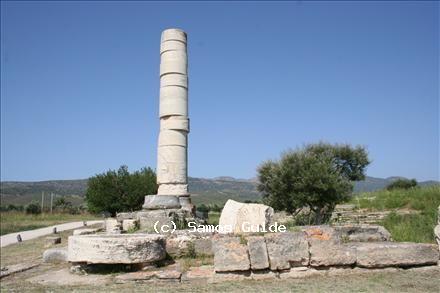
Seven kilometers south - west of the ancient city of Samos ( present - day Pythagoreio ), near the sea, is the Heraion, one of the most important sanctuaries of ancient Greece.
The temple was built near the mouth of the river Imvrasos because the area was connected with the worship of the goddess even though the ground isn't so stable.
This temple suits very well to the exponents of the Archaeological Museum. Owing to the myth, the Goddess Hera was born and raised here. In 500 BC. the temple still posed on 115 columns close to Ireon, nowadays only one single column-half has been conserved. Probably Hera has moved out because of that.
The temple of Hera is the largest Greek temple ever built which was faithfully reconstructed by Polykrates to replace the previous model designed by the architects Rhoikos and Theodoros of Samos and destroyed by an earthquake.
A single column of this colossal octastyle dipteral Ionic temple (enneastyle on the west side) still stands, in the northeast corner.
A true "stone forest" stood around the deep pronaos and the huge long cella, both tripartite. A triple row of columns screened the short sides, and the capitals of the outer peristalsis were in the standard volute design, while those of the inner peristalsis followed the Ionic kyma model.
A continuous frieze adorned the top of the walls of the pronaos and the cella. In the foundations, the bases of columns and other blocks from the previous Heraion can still be seen.
Despite its size and significance, the Heraion was not a panhellenic sanctuary like Delphi or Olympia.
Belonging exclusively to Samos, the development of the temple of Hera was inseparably bound up with the political history of the city.
The temple was built at the mouth of the Imbrasus river on terrain which is not especially stable, but it seems that this was dictated by the fact that this particular spot was associated with the worship of the goddess Hera.
Schedule: Tuesday - Sunday: 08:30 to 15:00, Mondays: closed
Tickets: 3 Euros, Reduced: 2 Euros

